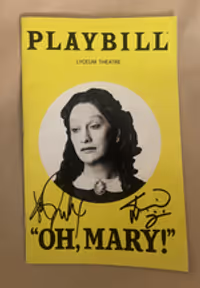GIRL FROM THE NORTH COUNTRY Reopening Night Thread
#25GIRL FROM THE NORTH COUNTRY Reopening Night Thread
Posted: 1/23/22 at 8:00pm
teatime2 said: "Caught the final performance today. I saw it twice and loved it. I don't remember Pressing On part of that iteration. Is that correct?"
I think it’s been in the show since it officially opened. It’s also the closing track on the cast album, which was recorded days before the Broadway shutdown.
VintageSnarker
Broadway Legend Joined: 1/30/15
#26GIRL FROM THE NORTH COUNTRY Reopening Night Thread
Posted: 1/23/22 at 8:04pm
Auggie27 said: "Today was third time, the closing quite a stunning performance before a full house, the balcony full of comped folk. Winningham offered the third, unused verse of “Forever Young” a cappella. No dry eyes visible, on stage or in the house."
I mean, I was in the balcony not comped in an awful seat. But I moved at intermission. My eyes were dry but I did end up enjoying the show more than I'd expected to. A lot of the songs are barely related to the context in which they're introduced which explains why I couldn't follow the plot from the album. But it mostly worked in person at creating atmosphere and channeling emotions. I did think the Elias and Elizabeth characters bordered on offensive and the plot was sketched out in familiar tropes but I wasn't bored by it. The Belasco is such a beautiful theater. If they do come back, I don't know if they'll find another venue that fits the show as well.
#27GIRL FROM THE NORTH COUNTRY Reopening Night Thread
Posted: 1/23/22 at 9:15pm
The song is on the album, and in, all three times that I saw the show on Broadway.
#28GIRL FROM THE NORTH COUNTRY Reopening Night Thread
Posted: 1/24/22 at 1:14am
VintageSnarker said: "I mean, I was in the balcony not comped in an awful seat. But I moved at intermission. My eyes were dry but I did end up enjoying the show more than I'd expected to. A lot of the songs are barely related to the context in which they're introduced which explains why I couldn't follow the plot from the album. But it mostly worked in person at creating atmosphere and channeling emotions. I did think the Elias and Elizabeth characters bordered on offensive and the plot was sketched out in familiar tropes but I wasn't bored by it. The Belasco is such a beautiful theater. If they do come back, I don't know if they'll find another venue that fits the show as well."
I recently caught this because of all of the positive notices on here. I didn’t want to miss it in case the plans to reopen fall through. The Elias character is offensive the second he walks onstage. His act two showstopper where all of a sudden he’s “normal” is truly unacceptable. I don’t know how this isn’t getting talked about more. It not only took me out, but it turned me off.
I did find the arrangements quite good, but the function of music in the show is questionable. This is one where I was thinking, “but we all see that the emperor is naked, right?” Still, I’m a huge Mare Winningham fan and Jeannette Bayardelle needs a vehicle.
#29GIRL FROM THE NORTH COUNTRY Reopening Night Thread
Posted: 1/24/22 at 6:00am
I saw this show three times. See, I didn’t find the Elias character offensive - reminding me a lot of Lennie from “Of Mice & Men”. Keeping in mind, this show is set in 1934 during the Great Depression - most people like himself would’ve likely been discarded and institutionalized, but his parents kept him and still hoped he would be able to develop, even when it’s clear he won’t and then it’s alluded that he was involved in an accidental death; he and his parents are fleeing to protect him.
As for “Duquesne Whistle”, I personally interpreted it as a sequence where Elias is now free of the limitations and suffering he experienced while alive and is on his way to heaven in grand fashion. Though I no longer practice - being raised a Christian, I always heard that death releases those from earthly suffering on their way to a peaceful and pain free afterlife.
The Other One
Broadway Legend Joined: 4/1/08
#30GIRL FROM THE NORTH COUNTRY Reopening Night Thread
Posted: 1/24/22 at 8:28am
teatime2 said: "Caught the final performance today. I saw it twice and loved it. I don't remember Pressing On part of that iteration. Is that correct?"
I don't remember "Pressing On" being in the show at the Public, but it seems to have been a part of the Broadway production right from the start. It's on the album.
"Pressing On" has always been my favorite song of Dylan's gospel period. Closing the show with it was inspired and inspiring.
willep
Broadway Legend Joined: 9/20/08
#31GIRL FROM THE NORTH COUNTRY Reopening Night Thread
Posted: 1/24/22 at 8:33am
quizking101 said: "I saw this show three times. See, I didn’t find the Elias character offensive - reminding me a lot of Lennie from “Of Mice & Men”. Keeping in mind, this show is set in 1934 during the Great Depression - most people like himself would’ve likely been discarded and institutionalized, but his parents kept him and still hoped he would be able to develop, even when it’s clear he won’t and then it’s alluded that he was involved in an accidental death; he and his parents are fleeing to protect him.
As for “Duquesne Whistle”, I personally interpreted it as a sequence where Elias is now free of the limitations and suffering he experienced while alive and is on his way to heaven in grand fashion. Though I no longer practice - being raised a Christian, I always heard that death releases those from earthly suffering on their way to a peaceful and pain free afterlife."
Yeah, that’s 100% how I saw “Duquesne Whistle” and quite literally what the song is there to do.
kwoc91
Featured Actor Joined: 9/2/21
#32GIRL FROM THE NORTH COUNTRY Reopening Night Thread
Posted: 1/24/22 at 9:30am
willep said: Yeah, that’s 100% how I saw “Duquesne Whistle” and quite literally what the song is there to do.
Same, and I found the beginning of Duquesne Whistle to be one of the most emotionally impactful moments I've seen on stage in quite some time.
I really adored this show and I'm sad it's gone. We'll see if it reopens but I have my doubts.
#33GIRL FROM THE NORTH COUNTRY Reopening Night Thread
Posted: 1/24/22 at 10:09am
I clearly understand the function of the song, but how it came across was a neurotypical actor who had been playing a caricature of someone with a disability becomes “normal” and leads the cast in a rousing gospel number. Any depiction of a person becoming “normal” in this sense is terribly offensive. We should be normalizing people/actors with disabilities, not depicting them stereotypically and show them only as “whole” when they get rid of their mannerisms. I have multiple family members who are not communicative, but I would never dream of them breaking out into song in this manner. I think it’s in very poor taste.
#34GIRL FROM THE NORTH COUNTRY Reopening Night Thread
Posted: 1/24/22 at 10:14am
Add me to the three posters who explicate the mysterious way "Duquesne Whistle" works in the piece, and ditto, the comments on Elias and Elizabeth. If anything, the play proper is a prism on the brutal absence of a safety net for all challenged people, all of whom are offered soul-bearing moments of agency and grace. It's a portrait of survival, and the myriad ways human beings cope in the face of insurmountable obstacles. In its melancholy pall, it finds a recognizable humanity that stirs our compassion. I loved these characters. That said, I don't think you can convince someone who feels differently via debate, but it's worth noting how many of us -- here and in the UK -- respond to what this theater piece illuminates and how it does so.
ElephantLoveMedley
Broadway Star Joined: 10/14/21
#35GIRL FROM THE NORTH COUNTRY Reopening Night Thread
Posted: 1/24/22 at 10:19am
Just chiming in to say that I really appreciate the critical discussion about the show happening on this thread. I saw it twice (once at the Public, once on Broadway) and despised it both times. For me, it committed the cardinal sin of theatre: I was bored out of my mind from beginning to end. However, it's fascinating to read what others were able to dissect from this work that I clearly didn't. (This thread is a good example of why I continue to come back to these boards!)
#36GIRL FROM THE NORTH COUNTRY Reopening Night Thread
Posted: 1/24/22 at 10:37am
Perhaps because of this or other threads, I understood the why of the show, and I could see the mechanics of the piece. I truly wanted to like it based on the enthusiasm. It’s fascinating how the same reasons someone likes something could be why someone does not like it. I found myself not wanting to be manipulated by the show, as if I knew how they wanted me to feel and I rejected it. I had also listened to the album beforehand and enjoyed it, but I think it’s better as an album than as a companion to the play.
VintageSnarker
Broadway Legend Joined: 1/30/15
#37GIRL FROM THE NORTH COUNTRY Reopening Night Thread
Posted: 1/24/22 at 4:44pm
quizking101 said: "I saw this show three times. See, I didn’t find the Elias character offensive - reminding me a lot of Lennie from “Of Mice & Men”."
I 100% thought of "Of Mice & Men" as well. But while the characters can have a Depression-era view of neurodivergence, it seems like the show's POV and the performance were similarly dated. I'd argue the show actually sidesteps us truly empathizing with Elias. We see him from an outside (infantilized, almost monstrous) perspective for most of the show and then we feel sympathy for him and his parents after the "accident." Accepting the theatrical device, Duquesne Whistle/Senor pretty much puts nonsense words in his mouth. We never know how he feels about the world or his life or his relationships or the incident they're running away from. It feels like emotional catharsis but it isn't. It's just a good musical number.
It's not Sia's Music but arguing that this show is as sensitive and sophisticated as it could/should be feels like a stretch.
I haven't begun to unpack my feelings on how the show handles race yet.
#38GIRL FROM THE NORTH COUNTRY Reopening Night Thread
Posted: 1/24/22 at 5:45pm
Speaking of, what’s the point of the son’s drunken, racist tirade when the character has a Black sister?
But I agree, Vintage. It felt dated the way the show handled these issues.
#39GIRL FROM THE NORTH COUNTRY Reopening Night Thread
Posted: 1/24/22 at 5:49pm
HeyMrMusic said: "Speaking of, what’s the point of the son’s drunken, racist tirade when the character has a Black sister?
But I agree, Vintage. It felt dated the way the show handled these issues."
I’m going to assume…he’s drunk and doesn’t really know what’s he’s saying/doing? If you were smashed, are you really gonna think you are cognizant of what comes out of your mouth? My thought could also be he thought he was some type of intruder.
VintageSnarker
Broadway Legend Joined: 1/30/15
#40GIRL FROM THE NORTH COUNTRY Reopening Night Thread
Posted: 1/24/22 at 6:13pm
HeyMrMusic said: "Speaking of, what’s the point of the son’s drunken, racist tirade when the character has a Black sister?"
He was obviously looking for a fight but maybe I missed the reason why. For example, if he was already injured and wanted to cover up the injury by baiting Joe into hitting him. Or maybe something Kate said to him made him want to prove his masculinity with violence?
(Full disclosure, I missed the beginning of the show before Mr. Perry's proposal. I don't know if this is why I felt little connection to Gene or Mrs. Neilsen or if those characters were just thinly written.)
#41GIRL FROM THE NORTH COUNTRY Reopening Night Thread
Posted: 1/24/22 at 8:36pm
It was an odd moment, and the person I went with also had the same question.
I personally think all the roles aren’t given much to do, but Gene was one of the biggest question marks for me. Mrs. Nielsen has a large presence in the opening scenes, so coming in late might have affected her impact for you.
I’m all for slice-of-life shows without much plot, but this one left me asking why, especially why the use of music and Bob Dylan’s catalogue.
Videos





